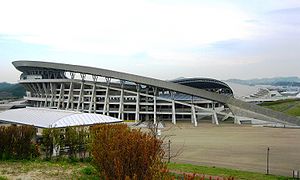Miyagi Stadium
 | |
 | |
| Location | |
|---|---|
| Coordinates | 38°20′07.41″N 140°57′01.51″E / 38.3353917°N 140.9504194°E |
| Owner | Miyagi Prefecture |
| Capacity | 49,133 |
| Surface | Grass |
| Construction | |
| Broke ground | 1996 |
| Opened | March, 2000 |
Miyagi Stadium (宮城スタジアム, Miyagi Sutajiamu) is an athletic stadium in the town of Rifu in Miyagi Prefecture, Japan. The stadium's capacity is 49,133. The crescent-shaped roof extending past the edge of the stadium is meant to evoke images of Date Masamune, a Daimyo of Mutsu Province, which included the present-day Miyagi Prefecture.
Miyagi Stadium hosted three matches in the 2002 World Cup, and also hosted the 56th National Sports Festival of Japan in 2001. It is one of the planned football venues for the 2020 Summer Olympics.[1]
The football field, is surrounded by a nine-lane track. A large video screen and scoreboard is installed in the northern end.
World Cup match history
| Date | Team #1 | Res. | Team #2 | Round |
|---|---|---|---|---|
| 2002-06-09 | 2–1 | Group G | ||
| 2002-06-12 | 1–1 | Group F | ||
| 2002-06-18 | 0–1 | Second Round |
Other notable events
Besides the game against Turkey, Miyagi Stadium has hosted three friendly matches involving the Japanese national football team: A 1-1 draw against Slovakia on June 11, 2000, a 5-4 victory against Honduras on September 7, 2005, and a 2-4 loss against Uruguay on August 14, 2013. J. League club Vegalta Sendai has held home games at Miyagi Stadium, and pop-music group SMAP has held two outdoor concerts at the venue as well.
Access
Rifu Station is the closest train station, although it is nearly 3.5 kilometers from the stadium. For major events, bus transportation is usually available from Izumi-Chūō and Sendai Stations. Before the World Cup, a spur from the Sanriku Expressway was built, which provided easier access for travellers by car from Tokyo and other locales.
See also
References
- ^ "Venue Plan". Tokyo 2020 Bid Committee. Retrieved 11 September 2013.
